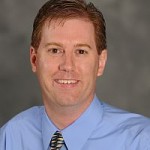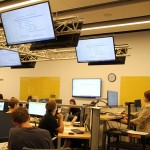 Information Technology invites you to attend the Active Learning Center’s open house on Friday, Aug. 22, from 1 to 4 p.m. in ME-EM 120. The Active Learning Center (ALC), formerly known as the ME-EM “Fishbowl.” has been completely transformed into a technology-rich collaborative learning space, featuring 72 student computer stations, three instructor stations and 29 collaboration LCD monitors hung from the ceiling. Staff will be on hand to provide tours and demonstrations.
Information Technology invites you to attend the Active Learning Center’s open house on Friday, Aug. 22, from 1 to 4 p.m. in ME-EM 120. The Active Learning Center (ALC), formerly known as the ME-EM “Fishbowl.” has been completely transformed into a technology-rich collaborative learning space, featuring 72 student computer stations, three instructor stations and 29 collaboration LCD monitors hung from the ceiling. Staff will be on hand to provide tours and demonstrations.
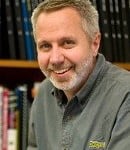 John ’64 ’69 and Cathi Drake have expanded their support for the endowed professorship that bears their name. With an additional $1 million commitment, they have increased funding for the position to $2 million, creating the latest endowed chair in Michigan Technological University’s Department of Mechanical Engineering–Engineering Mechanics.
John ’64 ’69 and Cathi Drake have expanded their support for the endowed professorship that bears their name. With an additional $1 million commitment, they have increased funding for the position to $2 million, creating the latest endowed chair in Michigan Technological University’s Department of Mechanical Engineering–Engineering Mechanics.
Gordon Parker, who was appointed to the Drakes’ professorship when it was established in 2007, will continue to hold the new John and Cathi Drake Endowed Chair in Mechanical Engineering.
The Drakes’ annual gifts have already allowed Parker to support students and explore new avenues of research that otherwise might not receive funding from industry or government agencies.
“John and Cathi have been very pleased with Gordon’s productivity and effectiveness under their sponsorship, and as a result they decided to increase their commitment,” said William Predebon, chair of the department. “The funds are seed money; they let him engage in high-risk research that Gordon can eventually leverage into larger funding opportunities.”
John Drake earned a BS in Mechanical Engineering at Michigan Tech in 1964 followed by an MS in Business Administration in 1969. He and Cathi founded Drake Manufacturing Services in 1972. John, who retired as its president in 2007, continues to receive licensing revenues from one of his innovations. “It’s something I dreamed up and made work: a ball nut used in power steering in pickup trucks and SUVs,” he explains. “It’s now being used in cars in Europe and even to make power brakes.”
This success helped to drive their latest donation. “We had not made such a big gift before we established the professorship, and we’ve been feeling our way through, making sure the investment is well spent. And it has been,” said Drake. “Gordon is just wonderful. He’s grown immensely during these past seven years, and we’ve done well in our own right. So we thought we’d step up and make him a full chair holder.”
In addition, the Drakes view their gift as a vote of confidence in Michigan Tech. “We’ve become convinced not only of Tech’s applying our money to the purpose intended, but also of its fundraising efficiency. We, like many donors, come from business, and we hate to waste money. Academia is not usually known for efficiency, but we have been very impressed with Tech in this area.”
For his part, Parker can’t say enough about the value of the Drakes’ support.
“It’s been incredible,” he says. “Unless you are immersed in academia, you probably don’t know how much a faculty member’s career can revolve around the search for money. The funds from the professorship have allowed me to support student research assistants and do some really interesting exploratory work.”
The additional support that will come from the endowed chair can only expand those benefits. “I’d like to express my deep thanks to the Drakes, not only John and Cathi but the whole family. It’s a humbling and profound experience to have their name next to my door.”
The Drakes have also made two recent gifts to honor their daughters.
“Through a generous gift in honor of their noted scientist daughter, John and Cathi took a leadership role in supporting the Great Lakes Research Center by naming the Invasive Species Lab in honor of Dr. Lisa Drake,” said center director Guy Meadows, who holds the Robbins Chair in Sustainable Marine Engineering. “Their support has been key to our efforts to track and halt invasive species in the Great Lakes.”
The Karen S. Richardson Endowed Scholarship, established in July, will support students entering the School of Business and Economics. The first scholarship is to be awarded this fall to an entering freshman, preferably from the Upper Peninsula. “We’re very appreciative of the Drakes’ generosity and their support of our students,” said Dean Eugene Klippel. “We’re particularly pleased that they chose to honor their daughter in this way, and we will make every effort to be excellent stewards of their gift.”
Dr. Gordon G. Parker_has been elected Fellow of the Society of Automotive Engineers (SAE).
Dr. Parker will be honored during the SAE 2014 World Congress and Exhibition in Detroit, MI, the week of April 6, 2015. Dr. Parker is being honored as a recognized international leader in control system design research in a variety of mobility-related applications form diesel engine exhaust aftertreatment to satellite formation flying.
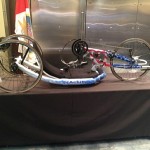 The documentary film Wings of Angels” will be Shown During Alumni Reunion.
The documentary film Wings of Angels” will be Shown During Alumni Reunion.
The public can view “Wings of Angels,” a documentary film featuring Michigan Tech mechanical engineering students, in the lobby of the MEEM building during Alumni Reunion. The movie will be shown on the hour, 8 a.m.-5 p.m., Thursday-Saturday, Aug. 7-9.
 News from Tech Today — July 23, 2014 —
News from Tech Today — July 23, 2014 —
The Michigan Tech Mobile Lab traveled to several college campuses in southern Michigan recently. Instead of a single person providing a lecture, the Mobile Lab team provided a hands-on seminar for the Wayne County Community College Districts ongoing Global Conversations Speaker Series in Detroit and Taylor, Michigan. Attendees included students from both Wayne State University and Wayne County Community College.
 Tolou Shokuhfar will be investigating the inner workings of a protein that plays a key role in human health with funding from a five-year, $400,000 Faculty Early Career Development (CAREER) Award.
Tolou Shokuhfar will be investigating the inner workings of a protein that plays a key role in human health with funding from a five-year, $400,000 Faculty Early Career Development (CAREER) Award.
Shokuhfar, an assistant professor of mechanical engineering-engineering mechanics at Michigan Technological University, will study the biomolecule ferritin, which stores iron in the body in a non-toxic, mineralized form and releases it safely. In humans, ferritin serves as a buffer between iron deficiency and iron overload, and when it malfunctions, it may be involved in a number of degenerative diseases, such as Alzheimer’s and Parkinson’s.
MORE
t its last meeting, Michigan Technological University’s Board of Control bestowed the Melvin Calvin Medal of Distinction on two distinguished alumni and longtime supporters of Michigan Tech: David House, Electrical Engineering ’65 and Richard Henes, Mechanical Engineering ’48. The Melvin Calvin Medal of Distinction is awarded to individuals associated with the University who have exhibited especially distinguished professional and personal accomplishments.
MORE
Effervescent enthusiasm for students and the classroom marks both winners of Michigan Technological University’s 2014 Distinguished Teaching Award. Tess Ahlborn, an associate professor of civil and environmental engineering, received the award in the associate professor, professor category. Scott Miers, newly promoted to associate professor of mechanical engineering–engineering mechanics, was honored in the assistant professor, professor of practice and lecturer category.
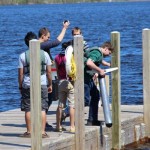 The news was not good. An underwater drone armed with the best technology on the planet had descended repeatedly to the bottom of the Indian Ocean, trying to find Malaysia Airlines Flight 370. Time after time, it turned up nothing.
The news was not good. An underwater drone armed with the best technology on the planet had descended repeatedly to the bottom of the Indian Ocean, trying to find Malaysia Airlines Flight 370. Time after time, it turned up nothing.
If Nina Mahmoudian has her way, the next generation of autonomous underwater vehicles (AUVs) will have a much better chance of getting it right.
MORE
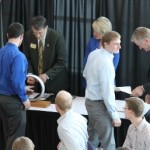
The ME-EM Order of the Engineer, Senior Awards Banquet and Capstone Design Day was April 22, 2013 at the Rozsa Center Lobby.
The keynote speaker for the banquet was Ms. Lee Ann Rouse, President and CEO Omni Tech International Ltd. Lee earned a bachelor’s degree in Mechanical Engineering from Michigan Tech in 1987.
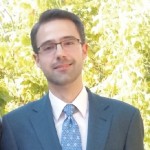 The ME-EM Graduate Seminar speaker on Thursday, April 24 at 4:00 in 103 EERC will be Dr. Antonio Gauchia from MTU.
The ME-EM Graduate Seminar speaker on Thursday, April 24 at 4:00 in 103 EERC will be Dr. Antonio Gauchia from MTU.
The title of his presentation will be ‘Finite Element Modeling of a Real Bus Structure: Effect of Electrified Powertrain’.
Environmental sustainability is driving powertrain design and development towards electrified vehicles. Bus powertrain has evolved from conventional internal combustion engine to hybrid powertrain. However, in terms of lateral vehicle dynamics, this type of vehicle is particularly sensitive to the height of the center of gravity. One of the most severe accidents that involve buses is rollover. Buses are especially prone to rollover due to their high ratio between centre of gravity height and wheel track. Therefore, bus safety must be re-assessed to verify that it still complies with current vehicle standards and regulations, in particular, those related to vehicle lateral dynamics. Bus manufacturers have to overcome these challenges to match standards and provide a reliable, safe and comfortable vehicle. This seminar will present the impact of powertrain design in bus rollover. It will deeply describe how to evaluate this effect from the initial finite element modeling stage of a real bus structure to the final one consisting in the evaluation of powertrain design influence in bus rollover. Two scenarios will be analyzed: a bus structure with conventional internal combustion engine components and a bus structure with hybrid powertrain components. The rollover threshold will be used to evaluate the lateral performance of each powertrain layout.
Dr. Antonio Gauchia finished his studies of General Engineering Degree in 2003 and obtained a PhD in Mechanical Engineering in 2006 at the University Carlos III of Madrid (UC3M). He teaches Vehicle Dynamics and Components, Transportation Engineering and Technical Drawing. During his 10 year experience at UC3M Mechanical Engineering Department, he has also collaborated in projects with industry and administration. His
research interests are vehicle experimental testing, vehicle dynamic simulation and bus safety rollover. He has been a Visiting Researcher at the University of Birmingham (U.K.) in collaboration with Ford. He is currently a Visiting Researcher at the ME-EM Department at Michigan Tech.
